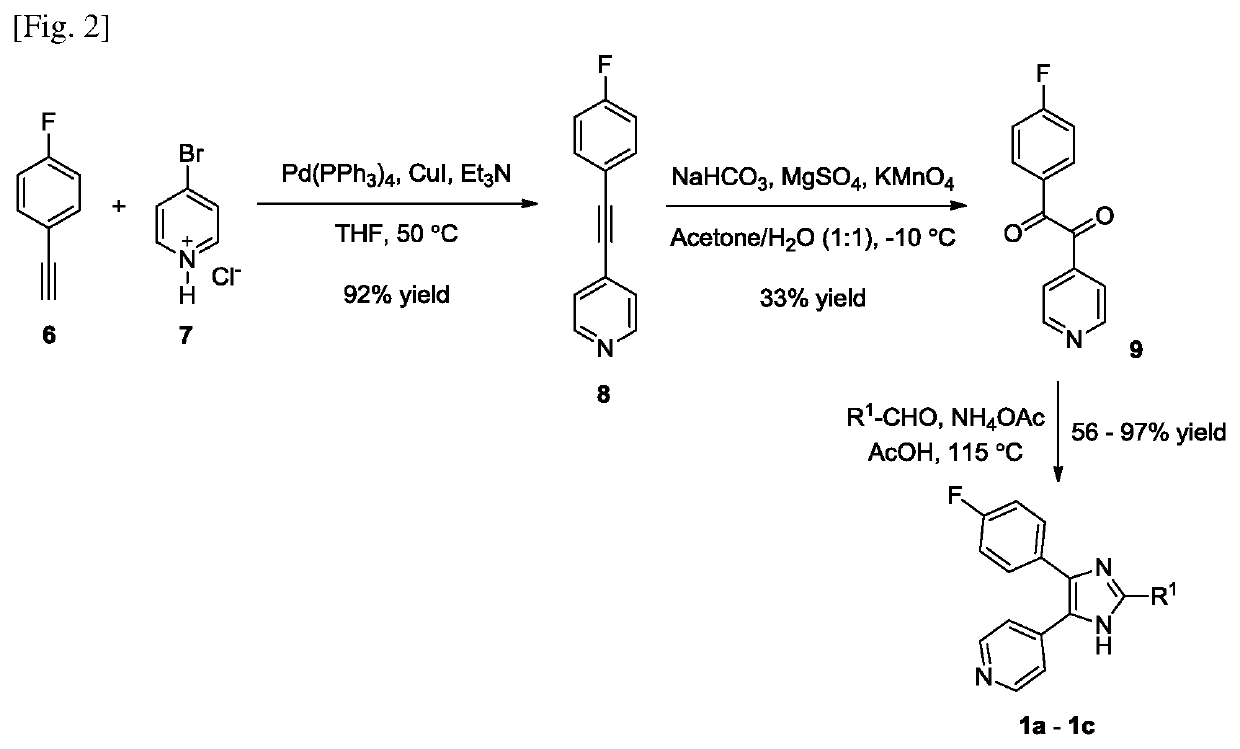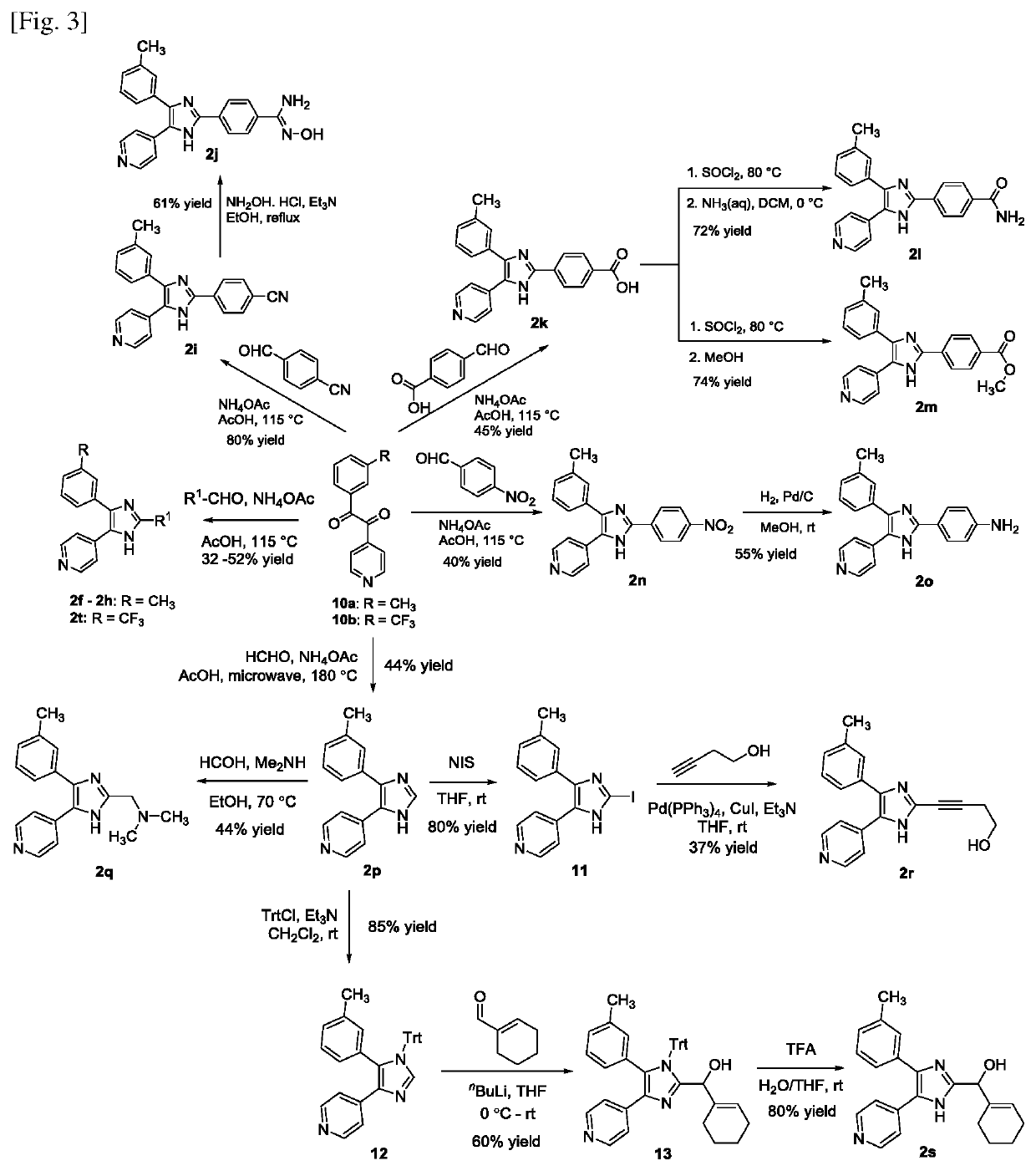2,4,5-tri-substituted azole-based casein kinase 1 inhibitors as inducers for cardiomyogenesis
a technology of casein kinase and azole, which is applied in the direction of cardiovascular disorder, drug composition, skeletal/connective tissue cells, etc., can solve the problems of limited number of suitable small molecules which can be utilized for cardiomyocyte differentiation, low efficiency (10%), and difficulty in overcoming associated difficulties, etc., to achieve the effect of high yield of cardiomyocytes
- Summary
- Abstract
- Description
- Claims
- Application Information
AI Technical Summary
Benefits of technology
Problems solved by technology
Method used
Image
Examples
example 1
and Methods
[0104]In the examples described below, unless otherwise indicated, all temperatures in the following description are in degrees Celsius and all parts and percentages are by weight, unless indicated otherwise. Reagents useful for synthesizing compounds may be purchased from commercial suppliers, such as Sigma-Aldrich Pte Ltd, Life Technologies or others and used without further purification, unless otherwise indicated, or obtained or prepared according to techniques known in the art.
[0105]The identity of all compounds was assessed after purification by HRMS-ESI analyses on an Agilent 6200 series accurate-mass time-of-flight (TOF) LC / MS in electrospray ionization (ESI) positive mode.
[0106]All the 1D and 2D NMR experiments for 1H (400.13 MHz), nuclei were performed on a Bruker AVANCE-400 digital NMR spectrometer. NMR spectra are reported in ppm with reference to an internal tetramethylsilane standard (0.00 ppm for 1H) or solvent peak(s) of CDCl3 (7.26 and 77.1 ppm) or CD3OD ...
example 2
of Compounds
[0175]The target compounds were synthesized using routes outlined in FIGS. 1 to 5. All of the synthesized imidazoles with unsubstituted N1 nitrogen were obtained as a mixture of annular tautomers which rapidly interconvert in solution. For compounds containing a chiral centre, they were synthesized as a racemic mixture of stereoisomers and applied in the biological studies as a racemic mixture. Details of the synthesis of the compounds are as follows:
[0176]All of the synthesized compounds (except IM-44) possess the 2,4,5-tri-substitution pattern on the azole core structure and can be classified according to the general structures shown in FIG. 1.
[0177]Compounds 1a-1c and other compounds containing the vicinal pyridin-4-yl / 4-fluorophenyl moiety similar to SB203580 were synthesized according to FIG. 2. Sonogashira coupling between 4-fluorophenylacetylene 6 and 4-bromopyridine 7 gave 1,2-disubstituted alkyne 8 which was oxidized to 1,2-diketone 9 using potassium permanganat...
example 4
iation of Cardiomyocytes with 2,4,5-Tri-Substituted Azole Compounds
[0250]Initial studies with the 2,4,5-tri-substituted azole compounds were done at a fixed concentration of 5 μM. The 44 small molecules in table 2 were applied to hESC3 Nkx2.5eGFP / w cells after EB formation until day 8 of differentiation. On day 16 of differentiation, EBs were dissociated and analyzed with flow cytometry for green florescence protein (GFP) expression as a marker for cardiomyocyte differentiation. The results obtained are presented as GFP fold over DMSO control in FIG. 6a, where 1 represents an effect similar to DMSO. Only compounds for which the GFP expression fold over DMSO exceeded 2 are significantly cardiogenic. The initial screen identified one novel compound (IM-30) with similar cardiogenic properties as SB203580 and SB202190, which are established compounds for cardiomyocyte differentiation. Interestingly, a highly similar compound, IM-31 showed complete inhibition of cardiomyocyte development...
PUM
| Property | Measurement | Unit |
|---|---|---|
| diameter | aaaaa | aaaaa |
| time | aaaaa | aaaaa |
| total volume | aaaaa | aaaaa |
Abstract
Description
Claims
Application Information
 Login to View More
Login to View More - R&D
- Intellectual Property
- Life Sciences
- Materials
- Tech Scout
- Unparalleled Data Quality
- Higher Quality Content
- 60% Fewer Hallucinations
Browse by: Latest US Patents, China's latest patents, Technical Efficacy Thesaurus, Application Domain, Technology Topic, Popular Technical Reports.
© 2025 PatSnap. All rights reserved.Legal|Privacy policy|Modern Slavery Act Transparency Statement|Sitemap|About US| Contact US: help@patsnap.com



